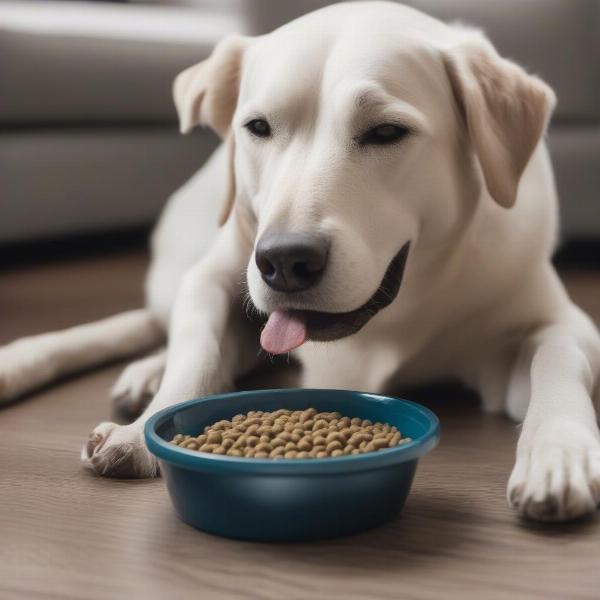A well-balanced dog menu is crucial for your furry friend’s health and happiness. Just like humans, dogs require a specific combination of nutrients to thrive. This comprehensive guide will delve into the essentials of creating a perfect dog menu, covering everything from understanding your dog’s nutritional needs to choosing the right ingredients and preparing delicious, healthy meals. [keyword] is essential for responsible pet ownership, and we’ll explore why.
Understanding Your Dog’s Nutritional Needs
Every dog is unique, and their dietary requirements vary based on factors like age, breed, size, activity level, and overall health. Puppies, for instance, need more calories and nutrients for growth than adult dogs. Similarly, active breeds like Border Collies require a higher caloric intake compared to less active breeds like Bulldogs. Understanding these specific needs is the first step towards building a balanced dog menu.
Tailoring Your Dog Menu to Specific Needs
Senior dogs often require specialized diets to support their aging bodies. These diets might focus on joint health, cognitive function, and maintaining a healthy weight. For dogs with allergies or specific medical conditions, a veterinarian-prescribed diet is often necessary. Consulting with your veterinarian is highly recommended to ensure your dog’s menu meets their individual health requirements.
 Tailored Dog Menu for Senior Dogs
Tailored Dog Menu for Senior Dogs
Choosing the Right Ingredients for Your Dog Menu
A healthy dog menu revolves around high-quality protein sources, healthy fats, digestible carbohydrates, and essential vitamins and minerals. Meat, poultry, and fish are excellent protein sources, providing the building blocks for strong muscles and tissues. Healthy fats, found in sources like fish oil and flaxseed oil, contribute to healthy skin and coat.
Deciphering Dog Food Labels
Learning to interpret dog food labels is crucial for making informed choices. Look for foods that list whole meats or meat meals as the primary ingredients. Avoid foods with artificial colors, flavors, and preservatives. Also, pay attention to the guaranteed analysis, which outlines the minimum percentages of crude protein, fat, fiber, and moisture.
Homemade vs. Commercial Dog Food: Which is Right for You?
Both homemade and commercial dog food have their pros and cons. Homemade diets allow for complete control over ingredients and can cater to specific dietary needs. However, they require careful planning and preparation to ensure nutritional balance. Commercial dog food offers convenience and often comes formulated for specific life stages and health conditions. norton dog menu Choose the option that best suits your lifestyle and your dog’s needs.
Transitioning to a New Dog Menu
When introducing a new dog menu, it’s essential to do so gradually to avoid digestive upset. Start by mixing a small amount of the new food with the old food, gradually increasing the proportion of the new food over several days. Monitor your dog for any signs of digestive issues, such as vomiting or diarrhea.
Conclusion
Crafting a perfect dog menu requires a thoughtful approach, considering your dog’s individual needs and choosing high-quality ingredients. Whether you opt for homemade or commercial food, prioritizing nutritional balance is key to ensuring your dog’s long-term health and well-being. Remember, [keyword] plays a vital role in your dog’s overall health. Consult with your veterinarian for personalized guidance and ensure your furry friend enjoys a healthy and delicious diet.
FAQ
- How often should I feed my dog? Most adult dogs thrive on two meals a day.
- What are some signs of food allergies in dogs? Common signs include itching, skin rashes, gastrointestinal upset, and ear infections.
- Can I give my dog table scraps? While some table scraps are safe, many are toxic to dogs. Consult your veterinarian for a list of safe and unsafe foods.
- How much water should my dog drink? A general guideline is one ounce of water per pound of body weight per day. big dog menu
- What should I do if my dog refuses to eat? If your dog consistently refuses to eat, consult your veterinarian to rule out any underlying medical conditions. holy dog menu
- Is it okay to give my dog supplements? Always consult your veterinarian before giving your dog any supplements. spoon fusion korea oh k dog menu
- How can I tell if my dog’s food is causing digestive problems? Look for signs like vomiting, diarrhea, gas, and changes in appetite.
ILM Dog is a leading online resource dedicated to providing expert advice on dog care and nutrition. We offer comprehensive guides on breed selection, health care, training, nutrition, grooming, and much more. Our mission is to empower dog owners with the knowledge and resources they need to provide the best possible care for their beloved companions. brown dog menu For any questions or inquiries, please contact us at [email protected] or call us at +44 20-3965-8624. ILM Dog is here to support you every step of the way.